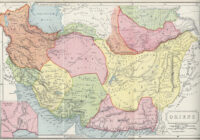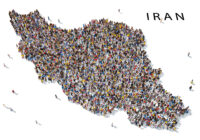In this edition of The Interview, Fair Observer talks to Dr. Edward Wastnidge, a lecturer in international studies at the Open University.
Four decades after Iran and the United States severed diplomatic relations, tensions are running higher than at any point in the 21st century. US President Donald Trump, who has constructed a foreign policy around his “America First” mantra, having abandoned multilateralism and making democracy and human rights a global priority, has been exerting an unprecedented amount of pressure on Iran since coming to power. Key people in formulating President Trump’s foreign policy, namely Secretary of State Mike Pompeo and his national security adviser, John Bolton, have shown belligerence toward Iran previously by throwing weight behind the exiled Iranian group, Mujahedeen e-Khalq (MEK), championing regime change in Tehran.
A recent poll by the Associated Press and the NORC Center for Public Affairs Research at the University of Chicago found that 63% of Americans disapprove of President Trump’s handling of international affairs. The divisions in the poll were more significant along party lines: Only 8% of Democrats surveyed said they approve of the president’s foreign policy.
In May 2018, Trump announced his controversial decision to withdraw the United States from the Joint Comprehensive Plan of Action (JCPOA) — the first multilateral agreement involving the governments of Iran and the United States since 1979 — that was supposed to put an end to the controversy surrounding Iran’s nuclear program. Since then, the already strained relations between Tehran and Washington have been on a downward spiral, and the United States targeted Iran with several rounds of economic sanctions. The Trump administration then designated Iran’s Revolutionary Guard Corps (IRGC) as a foreign terrorist organization, expectedly drawing ire from the authorities in Tehran.
A poll conducted shortly before Trump’s announcement concerning the JCPOA showed that less than one in three Americans favored the president’s decision to pull out of the nuclear agreement with Iran. Now, with the reinstatement of the US sanctions, Tehran has given a two-month ultimatum to the European Union to take practical steps to salvage the agreement or it will abrogate some of its commitments under the agreement.
In this edition of The Interview, Fair Observer talks to Dr. Edward Wastnidge, a lecturer in international studies at the Open University, about the fluctuations in the Iran-US relations, US sanctions on Iran and the fate of the JCPOA.
The text has been lightly edited for clarity.
Kourosh Ziabari: Hostility between Iran and the United States has risen to an alarming level. The State Department has announced that it will not issue waivers to countries importing Iran’s oil, and that they should expect to be sanctioned if they continue to purchase crude from Iran. Tehran has threatened that it will close down the Strait of Hormuz if it’s not able to sell its oil. What’s the endgame for both sides here?
Edward Wastnidge: I honestly think that the US has no idea what its “endgame” is, in terms of how it should reach it or what it should look like. It is pursuing a hopelessly misguided policy that only serves the interests of its key regional allies and makes the US appear as an irrational, vindictive power. This is what happens when you sell your foreign policy to the highest bidder.
The result is that once trusted allies, such as traditional friends of the US in the EU, find themselves increasingly at odds with US foreign policy — especially when it comes to Iran. The US doesn’t have a clear policy because you have a tension between warmongering politicians like [John] Bolton and [Mike] Pompeo, an unpredictable and naive president, and a war-weary military and security apparatus. The recent claim by John Bolton that an already scheduled visit to the Persian Gulf by the USS Abraham Lincoln is a “warning” in response to unsubstantiated claims of hostile acts by Iran shows how disjointed US thinking is.
For Iran, it is about maintaining the moral high ground — both in terms of upholding its independence in foreign affairs and in sticking to its commitments under the JCPOA. This is a tough balancing act though, because its JCPOA commitments come at a price, and Iran rightfully does not want to be cowed by external pressures that run contrary to its own national interests. We’ve seen in the recent announcement by President Rouhani that Iran only has a finite amount of patience when it comes to waiting for the other signatories to think of creative ways to counter US unilateral actions.
Ziabari: Iran’s Foreign Minister Javad Zarif recently told a meeting hosted by the Asia Society that Iran is not waiting for a Democratic president to come to power in the United States so that tensions between the two countries might be eased. What’s your prediction for the outcome of the 2020 US presidential election? How can different scenarios impact the prospects of Iran-US relations?
Wastnidge: I think it is hard to say with any certainty what the outcome will be, given that no one seriously expected Trump to offer a serious challenge when he first announced his intention to run for president. We are living through something of a populist moment, where unscrupulous politicians will do anything for votes, and a lot will depend on whether Trump can galvanize his core support from the position of being the incumbent rather than that of an outsider.
In terms of Iran-US relations, the Iranian government is loath to give any sense of agency to the vicissitudes of US politics and their impact on Iran, hence Zarif’s comments, which are basically emphasizing the independent posture of the Islamic Republic and the lack of trust in the US political class. However, several Democratic [candidates] have voiced their support for a US return to the JCPOA and an end to US unilateralism, so this is likely to create a more conducive atmosphere for the reduction of tensions, should one of them be successful in securing the presidency.
Nevertheless, a lot of confidence has been lost, and there would need to be serious conciliatory moves on the part of the US in order for it to be perceived as a reliable and trustworthy international partner — something it has rarely managed to be.
Ziabari: The designation of the IRGC as a foreign terrorist organization stirred anger in Iran. Tehran’s official standpoint is that it was encouraged by the Israeli Prime Minister Benjamin Netanyahu. How did the Trump administration come up with such an unexpected decision?
Wastnidge: This is another example of how US foreign policy is now utterly in thrall to the interests of its regional allies. US foreign policy has become purely transactional under Trump — his emphasis on maintaining relations with odious regimes because they help the US economy through their arms purchases reflects the core motivations of Trump the business man. If you extrapolate this to the level of Trump the so-called statesman, what you get is a gross caricature of a man — and by extension an administration — unable to offer any clear policy of its own and which just reflects the agendas of its allies.
External influence through lobbying is huge in US foreign policy — just take a look at the bile spewed by various think tanks in DC, awash with Saudi and Emirati money. You have commentators and pseudo-academics, funded by foreign governments who are taken seriously by a US regime that is at the same time both isolationist and seemingly interventionist, thus rendering itself incompetent and impotent when it comes to forming even-handed policies in the Middle East.
Ziabari: Is Iran left to struggle alone against the economic pressure from the United States? Will Iran’s traditional allies such as Russia, China, Turkey, Pakistan, India and Iraq help it sustain its economy and survive the brunt of US sanctions?
Wastnidge: No, I wouldn’t say that Iran is left completely alone, although the struggles faced through the US mounting economic warfare against it are hard to counter, given the US dominance over global finance. However, Iran has developed a high degree of nous and flexibility when faced with sanctions and will demonstrate this again when it comes to circumventing US attempts to drive its oil exports to zero. Also, it is important for allies such as Russia and China to demonstrate their own ability to maintain independence from the United States too. So they have a common cause with Iran, and despite their own susceptibility to US economic pressure, they will not be keen to completely accede to US interests in this regard.
In terms of other important partners of Iran, such as India, Turkey and Pakistan, while they don’t wish to agitate their own relations with the US too much, they also know that they are in a strong position to court [Washington’s] rivals, and so they may be given special dispensation to continue trading with Iran and not be penalized too harshly by the US, despite the current noises around suspending waivers. The US has recognized Iraq’s special position as a neighbor and ally of Iran, and it may have to apply a similar logic to other countries that have historically had important economic links with Iran. This might seem counterintuitive given the US’ hostility toward Iran, but it could well turn a blind eye as a means of safeguarding its own valuable ties with such states.
Ziabari: Secretary Pompeo has threatened that Iran should act like a normal country or see its economy crumble. Why is Iran singled out by the Trump administration and subjected to an unprecedented pressure campaign to change its policies? What is in Iran’s policies or behavior that appear to be “abnormal”?
Wastnidge: Iran is a normal country, albeit one endowed with a unique historical and political heritage that has given it a strong independent streak — one which often runs counter to the interests of the United States. It is singled out because of the vacuum at the heart of US foreign policy, where US economic interests and those of its regional allies predominate. Contrast Iran’s adherence to multilateral diplomatic instruments such as the JCPOA with the US withdrawal from it and other international agreements, and its clear that Iran is acting like a so-called “normal country,” while the US acts in a way that has ostracized some of its longest-standing allies.
I think a big part of the problem here is the language used by people in the Trump regime and those who support his policies in the Western media and other forms of commentary and analysis. The academic world is particularly complicit in this too, unfortunately. We see regular use of terms such as “proxy” and “regime” to describe Iran’s allies and its government, and yet groups and governments that are backed by the US, its allies, and the West more broadly are never spoken of in such terms.
 Iran has allies in Iraq and Lebanon for example, that are an indelible part of the political fabric in those countries. They are political actors in their own right, with their own agency, and while they may be supportive of and get support from Iran, it does not mean that they are mere proxies — they have their own respective national focus alongside wider common causes which they share with the Islamic Republic, such as resistance to takfiri extremist groups and US and allied countries’ aims in the region. They are targeted by the US, or links are blown way out of proportion, such as with the Houthis in Yemen, as a means of pandering to Saudi and Emirati hegemonic desires.
Iran has allies in Iraq and Lebanon for example, that are an indelible part of the political fabric in those countries. They are political actors in their own right, with their own agency, and while they may be supportive of and get support from Iran, it does not mean that they are mere proxies — they have their own respective national focus alongside wider common causes which they share with the Islamic Republic, such as resistance to takfiri extremist groups and US and allied countries’ aims in the region. They are targeted by the US, or links are blown way out of proportion, such as with the Houthis in Yemen, as a means of pandering to Saudi and Emirati hegemonic desires.
Ziabari: Do you think the Iran nuclear deal will survive now that the United States is not a party to it anymore? Will the European Union be able to keep the accord alive?
Wastnidge: It has survived a year without the US, and if it can outlive the Trump presidency, then it will be testament to its resilience as an exemplar of multilateral cooperation. However, much of this will depend on whether Iran is able to maintain the strategic patience that it has demonstrated so far. This is partly dependent on the EU getting its act together with INSTEX [Instrument in Support of Trade Exchanges], showing that it can provide real alternative economic leadership in a global financial system still subservient to US power. We’ve seen in the recent statement from Rouhani that Iran will only wait two more months for these measures to become reality.
It also depends on the US avoiding a serious miscalculation in terms of hostile acts against Iran. Continued provocations of the kind seen recently will be likely to put the accord under serious threat.
Ziabari: Do you think the United States is after regime change in Iran? Is the US divided on whether to give diplomacy with Iran a chance or invest on toppling the government in Tehran?
Wastnidge: Yes, I think that some elements within the US administration and policy community are clearly looking to overthrow the government in Tehran and install a friendly, pliant regime in its place. This is the stuff of make-believe, however, and those who support such moves are utterly divorced from reality, existing as they do in an echo chamber reverberating to the drums of war.
There are some more reasoned voices in US politics, however, that would like to return to the previous climate of accommodation with Tehran and return to the JCPOA, as part of a more even-handed approach to the Middle East. We can also see this in the recent Congress pushback against US involvement in the Saudi-led onslaught in Yemen, and the fallout from the Khashoggi affair.
Ziabari: A lot has been said in the media about the US sanctions on Iran, which are wide-ranging and extensive. The human cost of the sanctions is perhaps the most underreported aspect of these punitive measures. How are the sanctions affecting the livelihoods of ordinary citizens? Will they result in a change of policy on the part of Iran’s leaders?
Wastnidge: These punitive economic sanctions have huge effect on normal civilians in Iran, especially in terms of access to critical medical supplies, and also the effect it has had on causing major rises in the price of basic goods. Despite purported US government support for Iranian citizens, this amounts to collective punishment, and will not be easily forgotten by those most affected.
I can’t see any change from Iran’s leaders given that this will show that US pressure works. It would show that US power knows no bounds and cannot be resisted. For Iran’s leaders, resilience and resistance will continue to define the response to these cruel and vindictive measures that only serve to further darken the reputation of the US in global politics.
The views expressed in this article are the author’s own and do not necessarily reflect Fair Observer’s editorial policy.
Support Fair Observer
We rely on your support for our independence, diversity and quality.
For more than 10 years, Fair Observer has been free, fair and independent. No billionaire owns us, no advertisers control us. We are a reader-supported nonprofit. Unlike many other publications, we keep our content free for readers regardless of where they live or whether they can afford to pay. We have no paywalls and no ads.
In the post-truth era of fake news, echo chambers and filter bubbles, we publish a plurality of perspectives from around the world. Anyone can publish with us, but everyone goes through a rigorous editorial process. So, you get fact-checked, well-reasoned content instead of noise.
We publish 2,500+ voices from 90+ countries. We also conduct education and training programs
on subjects ranging from digital media and journalism to writing and critical thinking. This
doesn’t come cheap. Servers, editors, trainers and web developers cost
money.
Please consider supporting us on a regular basis as a recurring donor or a
sustaining member.
Will you support FO’s journalism?
We rely on your support for our independence, diversity and quality.






